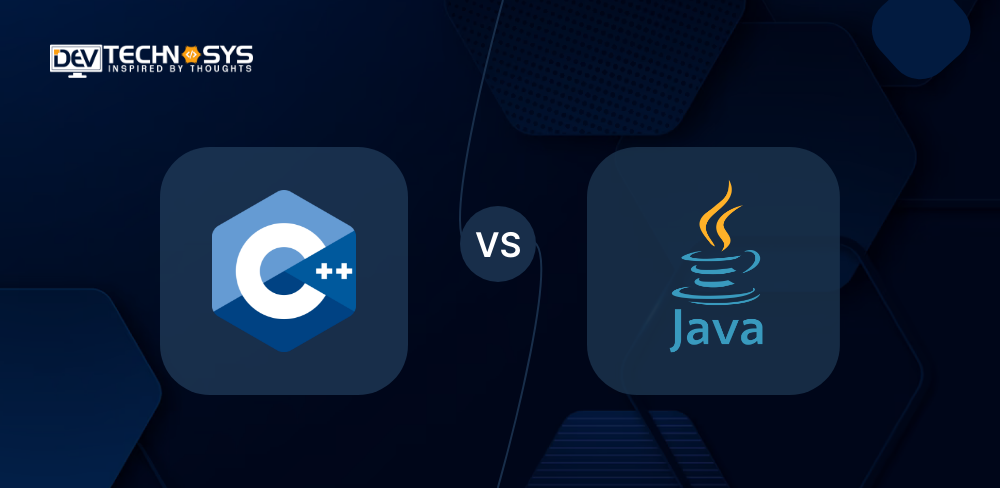Java and C++ are widely used today in competitive programming. These two languages are used by industries and in competitive programming because of their awesome features. C++ is widely used by coders because of its high performance, speed, and dynamic memory usage. Java is widely used by the IT industry. In terms of software development, it is incomparable with any other programming language.
Thus, this blog will discuss the difference between C++ vs Java, its advantages and disadvantages, and other aspects as well.
So let’s begin.
What is C++?
C++ is a language that uses object-oriented programming to create applications, websites and more. C++ was created in 1985 to add classes to C. C++ allows programmers to have more control over memory and system resources. C++ is designed to allow programs to be written only once and then compiled anywhere. C++ is not platform-independent.
System programming, low-level applications, gaming, and native programming are where C++ shines. C++ excels at large and fast software, such as enterprise systems that manage large amounts of data, like employees, libraries, and reservations. C++ was used in the creation of Apple OS, Mozilla Firefox Adobe Photoshop, Spotify Amazon, and Youtube.
What is Java?
Java is a language for programming software to be compatible with a variety of operating systems. Java is a programming language that is two-staged, which means it’s both a compiled and an interpretive language. It differs however from other compiled languages because it doesn’t compile directly into an executable.
The code in Java is first translated and then compiled into a binary format called Java Byte Code. The JBC is then compiled into native code for the operating system. Developers can benefit from this contrasting behavior as they only need to write code once, and it will run anywhere.
The “Write Once, Run Anywhere (WORA)philosophy became a highly popular concept and was sought out by developers. Sun Microsystems made the WORA philosophy popular in 1995 with its slogan.
C++ vs Java-Advantages
Advantages of C++
- Portability
Platform independence, or portability, is a property of C++. This allows users to run the exact same program across different operating systems and interfaces.
If you wrote a program for LINUX OS but then switched to Windows OS due to some reason, the program would run in Windows without error. This feature is very useful for programmers.
- Object-oriented
C++’s object-oriented feature is one of its biggest benefits. It includes concepts such as classes, inheritance and polymorphism. Data abstraction and encapsulation are also included these attributes increase the dependability of a program and allow for code reuse.
It also helps us solve real-world issues by treating data like an object. This feature was missing in C, so it was added. It has proven to be very useful.
This feature has given rise to many job opportunities and technologies. C++ is a fascinating language that was developed by combining Simula 67 and C. Simula 67 was the first object-oriented programming language.
- Multi-paradigm
C++ is a multi-paradigm language. The term “Paradigm”, refers to a style of programming. The logic, structure, and procedure of a program are all included in the “paradigm”. C++ has three different paradigms: imperative, generic, and object-oriented.
Now let’s try to understand generic programming. Generic programming is the use of one idea for multiple purposes. Imperative programming is the use of statements to change the state of a program.
- Low-level Manipulation
C++, being closely associated with C (a procedural programming language), allows for low-level data manipulation at a certain degree. C++ is used to create embedded systems and compilers.
- Memory Management
C++ provides the programmer with total control of memory management. This is both an asset and a liability, as it increases the responsibility on the part of the programmer to manage the memory instead of relying on the garbage collector. Pointers and DMA (Dynamic Memory Allocation) are used to accomplish this idea.
Advantages of Java
- Java is Simple
Easy-to-understand and learning programming languages are simple. Java is one of the easiest programming languages to understand and learn.
Java also makes it easier to implement codes by removing all the complicated features of C++ and C, such as pointers, structures, and unions.
- Java is an Object-Oriented Programming Language
Java is an object-oriented language. Procedural languages are difficult to understand and implement. The OOPs concept has made Java easier to implement, and more secure. Java can solve real-world issues with the help of OOPs concepts. It helps to maintain large code by breaking it into smaller named fragments.
- Java is a Secure Language
Pointers were used in languages like C++ and C, which allowed access to memory locations. Pointers are a security threat since they can allow unauthorized access to memory. Java uses OOPs concepts such as encapsulation and inheritance to increase security.
- Java is Cheap to Maintain and Easy to Use
Java is easy to maintain and develop due to its simplicity. Java runs on all machines, regardless of their hardware. This reduces development costs.
- Java is Platform-Independent
The WORA (Write Once Run Anywhere) functionality is the foundation of Java. Java enables the writing of Java programs on one machine and their execution on another. Hardware or operating systems have no impact on Java’s compatibility. It is platform-independent as a result.
C++ vs Java-Disadvantages
Disadvantage of C++
- Use of Pointers
It is difficult to understand pointers in C/C++ and they consume a lot of memory. The system may crash if you misuse pointers, such as wild pointers.
- Security Issue
Although object-oriented programs offer a higher level of data security than other languages, such as C, that aren’t object-oriented in nature, there are still some security concerns due to the existence of friend functions and global variables.
- Absence of Garbage Collection
C++, as we have discussed previously, gives the user full control over managing computer memory through DMA. A garbage collector that may delete unused data automatically is absent in C++.
- Absence of Built-in Thread
C++ doesn’t support threads. The concept of threads in C++ is relatively new. C++ can now support lambda functions.
Disadvantage of Java
- Slow and Poor Performance
Compared to native programming languages like C++ and C, Java requires more memory. Java is slower than other programming languages that are interpreted, such as C and C++, since the interpreter has to do more effort to translate the code into machine language. The JVM conducts a number of backend tasks that cause the program to lag. Java supports automatic garbage collecting, which runs continuously in the background, affecting performance.
- Poor GUI
Java is a long way behind when it comes to GUI. Java’s GUI builder is bad and unable to create complex UI. Many frameworks are available in Java to create GUI, such as Swing, SWT JavaFX JSF, etc. These frameworks have not been developed to the point where they can build complex GUIs. There are GUI builders for contemporary languages like Python, R, C#, and others.
- No Backup Facility
Java does not have any features that allow users to back up their data. The main focus is on storing data. However, there are no backup facilities.
- Memory Space is Required to be Large
Compared to other programming languages like C++ and C, Java utilizes more memory. Java has poor memory management. The trash collection feature of Java has a detrimental impact on performance.
- Code that is Verbose or Complex
Java is full of verbose, complex syntaxes. It can be difficult to remember these complex syntaxes. Many programmers choose Python and C++ because they are easier to understand.
- C++ vs Java-Key Difference
In this section, we will check out the difference between C++ vs Java from the below table:
|
C++ |
Java |
| C++ can only be used with a compiler | The interpreter and compiler are supported by Java. |
| Platform dependent | Platform independent |
| C++ uses the “cin” (pronounced “cout”) and “cout” | Methods of complex in/out (System.in & System. out). |
| Backward compatible with C | No backward compatibility |
| C++ is a combination of procedural and object-oriented programming. | Only supports Object-Oriented Programming style |
| Memory management is done manually, and users are responsible for memory consumption | JVM manages the memory without user interaction |
| C++ allows for multiple inheritances | Java does not support multiple inheritances |
| Both operator and method overloading are supported in C++. | Java only permits the overloading of methods. |
| Source code cannot be transferred across several operating systems. | Source code can be ported to any operating system |
| Libraries are low-level in functionality | Libraries provide high-level functionality |
| Run-time errors and exceptions are the responsibility of the programmer | JVM is responsible for run-time exceptions and errors |
| C++ supports pointers | Java does not support pointers |
| C++ supports custom data types | Java does not offer structures |
| C++ supports unions | Java does not offer unions |
| C++ requires manual class and object administration using the new and delete keyword | Java class and object management is fully automatic |
| C++ requires manual garbage memory clearing | Java includes an automatic garbage collector |
C++ vs Java: Detailed Comparison
C++ vs Java both have a lot of popularity, but their features, programming paradigms and use cases are different. This detailed comparison will cover a number of aspects that can help you better understand the differences between C++ vs Java.
1. Syntax and Structure
C++ is statically typed and supports object-oriented concepts. It uses a complex syntax and features such as pointers allow low-level memory to be managed.
Java is a statically typed language that was designed primarily for OOP. It is simpler and more consistent than C++. Java doesn’t have pointers and memory management is taken care of automatically by the garbage collection.
2. Platform and Portability
C++ is considered a system programming language and provides close-to-the-hardware access. C++ is used to develop operating systems, drivers, and game engines. It’s also widely used in performance-critical applications. C++ code must be compiled for each platform separately, which can impact portability.
Java is platform-independent. Java code is converted into bytecode, which runs on the Java Virtual Machine. Java is highly portable because this bytecode runs on any platform that has a JVM compatible with it.
3. Memory Management
C++ offers manual memory management through features such as dynamic memory allocation and new/delete. It allows developers to fine-tune their control of memory resources. However, it can also increase the risk of segmentation faults and memory leaks.
Java’s garbage collector manages memory automatically. Memory leaks are reduced by automatically reclaiming objects that are no longer referenced. It simplifies memory management but may cause some overhead because of garbage collection pauses.
4. Performance
C++ is considered to be faster than Java due to its low-level optimizations, direct memory access, and other features. It is appropriate for high-performance applications like computational programming or game creation.
Java’s performance, in general, is considered slightly slower than C++ because of the overhead of JVM and the automatic memory management. Java’s JIT compiler, which optimizes code that is frequently executed, can narrow the performance gap. Java’s focus is on productivity and portability, which often outweighs any slight performance sacrifice.
5. Concurrency & Multithreading
C++ has primitives for low-level threading like threads and condition variables. It provides fine-grained concurrency control and direct access to hardware features such as atomic operations. Due to race conditions and other issues with synchronization, C++ makes it difficult to manage concurrency.
Java supports multithreading, concurrency, and higher-level abstractions such as the ExecutorService utility and Concurrent utilities. Java’s thread management and synchronization mechanism is more robust and easy to use than C++.
6. Standard Library and Ecosystem
C++ comes with a rich library of standard functions, including support for input/output, containers, algorithms, and much more. There is also a vast ecosystem of third-party frameworks and libraries for different purposes.
Java’s standard libraries are extensive and provide a variety of utilities to perform common tasks. Additionally, Java offers a sizable ecosystem of libraries, frameworks, and tools, particularly for web development, corporate applications, and Android.
C++ vs Java: Which is Better?
The decision between C++ or Java is based on the requirements of the particular project. C++ is best suited to projects requiring low-level hardware control, performance-critical software, and system-level programming.
It allows for fine-grained optimizations and direct memory access. Java, on the other hand, is better suited for cross-platform applications, server-side apps, and projects which prioritize productivity and portability.
It offers automatic memory management and has a robust library. There is also a wide ecosystem of libraries, frameworks, and standard libraries. The final choice should be based on the project’s target platform, development limitations, and performance needs.
Conclusion
In conclusion, C++ vs Java languages are widely used by large Software Companies. Therefore, learning them both could be very useful. Java is a great choice for those who are looking to get a job within the Software Industry or have already obtained a Software Engineering Position. It offers a lot of flexibility and diversity.
For those who want to build operating systems, game engines, etc., C++ is a better choice than Java. You can even Hire C++ developers to develop software. C++ is a faster programming language than Java, so it can be used in situations where performance is important.






















